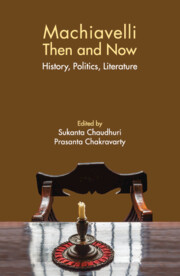16 - The Prince between Gramsci and Althusser
Published online by Cambridge University Press: 21 January 2022
Summary
I began preparing this chapter with the idea of putting two opposing interpretative models of Machiavelli, and particularly of The Prince, into tension: Gramsci's absolute historicism and Althusser's theoretical anti-humanism. These approaches appear to be opposites, even if both are expressions of the Marxist tradition—in the twentieth century, perhaps even the highest expressions. My work on the texts has largely subverted this initial idea.
But let us begin from the materiality of the texts. In the first place, it should be noted that neither Gramsci nor Althusser devoted a work to Machiavelli, if we understand by ‘work’ an effort that was completed and published as such.
Gramsci's reading of Machiavelli is contained for the most part in the 1949 volume Note sul Machiavelli, edited by Palmiro Togliatti and Felice Platone, which has well-known philological limitations. Both Valentino Gerratana's 1975 edition and the Edizione Nazionale directed by Gianni Francioni for the Fondazione Gramsci restore historical depth to Gramsci's work and enable us to situate each of Gramsci's reflections on Machiavelli in the context of the development of his thought. As for Althusser, throughout the work published during his lifetime, Machiavelli's name appears only rarely. However, this scarcity is offset by the large quantity of texts dedicated to Machiavelli contained in the archives at the Institut Mémoires de l’édition contemporaine (IMEC), which have now been published, at least in part:
• the manuscript of a course held in 1962
• the manuscript of a course held in 1971–2, of which there is a second version with numerous modifications presumably made in 1975–6, with the title Machiavelli et nous (Machiavelli and Us)—a version that Althusser continued to correct until the 1980s
• an article with the title ‘La solitude de Machiavel’ (‘Machiavelli's Solitude’), from 1977
• a note on Machiavelli and Gramsci, from 1977
• a text with the title Que faire? (What Is to Be Done?) with a long digression on Machiavelli, from 1978
• the part dedicated to Machiavelli in The Underground Current of the Materialism of the Encounter, from 1982
• two excerpts from an autobiography, given the title The Only Materialist Tradition by its editors, from 1985
• a manuscript text from 1986 entitled Machiavelli philosophe
- Type
- Chapter
- Information
- Machiavelli Then and NowHistory, Politics, Literature, pp. 296 - 315Publisher: Cambridge University PressPrint publication year: 2022



